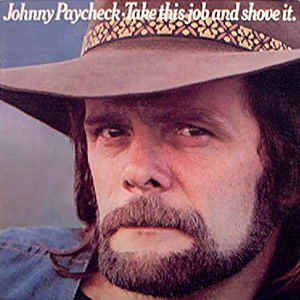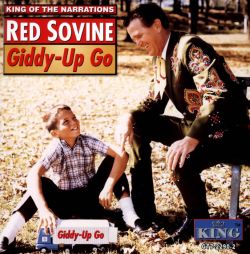
Shocking Blue was a Dutch rock band formed in The Hague in 1967. They had a number of psychedelic rock hits throughout the counterculture movement during the 1960s and early 1970s, including "Send Me a Postcard" and "Venus", which became their biggest hit and reached number one on the U.S. Billboard Hot 100 and many other countries during 1969 and 1970. The band sold 13.5 million records by 1973 but disbanded in 1974.
ATCO Records is an American record label founded in 1955. It is owned by Warner Music Group and operates as an imprint of Atlantic Records. After several decades of dormancy and infrequent activity under alternating Warner Music labels, the company was relaunched by Atlantic Records in early 2020.
Woodrow Wilson "Red" Sovine was an American country music singer and songwriter associated with truck driving songs, particularly those recited as narratives but set to music. His most noted examples are "Giddyup Go" (1965) and "Teddy Bear" (1976), both of which topped the Billboard Hot Country Songs chart.
"The Deck of Cards" is a recitation song that was popularized in the fields of both country and popular music, first during the late 1940s. This song, which relates the tale of a young American soldier arrested and charged with playing cards during a church service, first became a hit in the U.S. in 1948 by country musician T. Texas Tyler.
Nitocris were an Australian punk and heavy metal band formed in 1992. They were one of the country's first all-female punk rockers of the "grot grrrls" movement. They released their debut album, Screaming Dolorous on Phantom Records in 1994. Their second album, Nitocris, followed in 2000 and they disbanded in November 2001. At the ARIA Music Awards of 2001, Nitocris were nominated for 'Best Independent Release' for "Manic".
"The Phantom of the Opera" is a song from the 1986 stage musical of the same name. It was composed by Andrew Lloyd Webber, with lyrics written by Charles Hart and Richard Stilgoe, and additional lyrics by Mike Batt. The song was originally recorded by Sarah Brightman and Steve Harley, which became a UK hit single in 1986, prior to the musical. In its theatrical debut, it was sung by Brightman and Michael Crawford in their roles as Christine Daaé and the Phantom.

"Teddy Bear" is a song co-written and recorded by American country music singer Red Sovine. It was released in June 1976 as the title track to Sovine's album of the same name.

"All I Ask of You" is a song from the 1986 English musical The Phantom of the Opera, between characters Christine Daaé and Raoul, originally played on stage by Sarah Brightman and Steve Barton, respectively. It was written by Andrew Lloyd Webber, Charles Hart and Richard Stilgoe, and solely produced by Lloyd Webber. An operatic pop piece, its lyrics serve as dialogue between the two characters and discuss themes such as commitment and romance. Like Lloyd Webber's song "The Music of the Night", "All I Ask of You" was compared to the music found in Giacomo Puccini's 1910 opera La fanciulla del West.

"Six Days on the Road" is an American song written by Earl Green and Muscle Shoals Sound Studio songwriter Carl Montgomery, made famous by country music singer Dave Dudley. The song was initially recorded by Paul Davis and released in 1961 on the Bulletin label. In 1963, the song became a major hit when released by Dudley, peaking at #2 on the Billboard Hot Country Songs chart and cracking the Top 40 (#32) on the Hot 100, leading to it being hailed as the definitive celebration of the American truck driver.
Robert "Bobby" Winkelman is an American singer, song writer, rhythm guitarist, and bass guitarist. He was a founding member of the East Bay band, "The Epics".

American country artist Jean Shepard released twenty-five studio albums, fifteen compilation albums, one live album, seventy-one singles, two charting B-sides, and appeared on nine albums. Signing in 1952 with Capitol Records, her second single "A Dear John Letter" became a breakthrough hit. It topped the Billboard Hot Country Songs for six weeks and reached the Billboard Hot 100's fourth position. Shepard's solo career became successful in 1955 with the release several singles, including the top-five hits "A Satisfied Mind" and "Beautiful Lies". Shepard's debut studio album Songs of a Love Affair (1956) was the first country music "concept album" to be issued. She was commercially unsuccessful until a major comeback in 1964 with the top-five hit "Second Fiddle " and the studio album Lighthearted and Blue. The latter was her first to reach the Top Country Albums list. A series of hit singles continued for Shepard, such as "Many Happy Hangovers to You", "I'll Take the Dog", "If Teardrops Were Silver", and "Then He Touched Me". Accompanying albums reached the major positions on the country albums chart, including Many Happy Hangovers, Heart, We Did All That We Could, and Best by Request.

"Why Baby Why" is a country music song co-written and originally recorded by George Jones. Released in late 1955 on Starday Records and produced by Starday co-founder and Jones' manager Pappy Daily, it peaked at 4 on the Billboard country charts that year. It was Jones' first chart single, following several unsuccessful singles released during the prior year on Starday.

Rodney Crowell is the eponymous third studio album by American country music artist Rodney Crowell. It was released in 1981 by Warner Bros. Records and was his last album on that label before switching to Columbia. It was the first album Crowell produced by himself. It reached #47 on the Top Country Albums chart and #105 on the Billboard 200 albums chart. The songs, "Stars on the Water" and "Victim or a Fool" were released as singles. "Stars on the Water" reached #30 on the Hot Country Songs chart, his highest-charting song up to that point. It peaked at #21 on the Canadian country charts. "Victim or a Fool" reached #34 in the U.S. The album was rereleased on compact disc in 2005 paired with his previous album But What Will the Neighbors Think.

Take This Job and Shove It is the seventeenth album released by country music artist Johnny Paycheck. It was his second album released in 1977 and is his most commercially successful album, being certified platinum by the RIAA. It contains his most well known song, the David Allan Coe-written title song. It was his only single ever to reach #1 on the Country charts. Two other singles released from this album, "Colorado Kool-Aid" and "Georgia in a Jug", reached #50 and #17, respectively.
"Phantom 309" is a song written by Tommy Faile and released as a single by Red Sovine in 1967. It was a minor hit, peaking at number nine on the Billboard Magazine Country chart. The lyrics are spoken, rather than sung.

"Giddyup Go" is a country music song made famous by Red Sovine. Released in 1965, the song was the title track to Sovine's album released that same year.
Blue & Lonesome is an album by American country music artist George Jones released in 1964 on the Mercury Records label.

"Guava Jelly" is a song recorded by the Jamaican group Bob Marley and the Wailers. It was released as a 7" vinyl single through Tuff Gong and Green Door Records. It was issued commercially with B-side track "Redder Then Red", which was misspelled on its initial printing, in 1971. It was written and produced by Marley and features uncredited lyrical contributions from Bunny Livingston. A reggae composition like the majority of Marley's works, "Guava Jelly" contains a rocksteady and island-like production with lyrics loosely based around sexual intercourse. His use of the term "guava jelly" was likely referring to a specific type of sexual lubricant. It was favorably viewed by several reviewers, with many of them finding the composition to be sexual and about love. The group placed "Guava Jelly" on several compilation albums, including Africa Unite: The Singles Collection in 2005, and Owen Gray and Herbie Mann created their own versions in 1974 and 1975, respectively.
"Missing You" is a song written by Red Sovine and Dale Noe, which was originally released by Red Sovine in 1955, and was later a hit single for Webb Pierce in 1957, Ray Peterson in 1961, and was posthumously a hit for Jim Reeves in 1972. Sovine's version was the B-side of Red Sovine and Webb Pierce's hit single "Why Baby Why".

The Webb Pierce Story is a double album of the greatest hits of Webb Pierce. It was released in 1964 on the Decca label. It reached No. 13 on the Billboard country albums chart. The tracks are mostly re-recorded versions in stereo.











